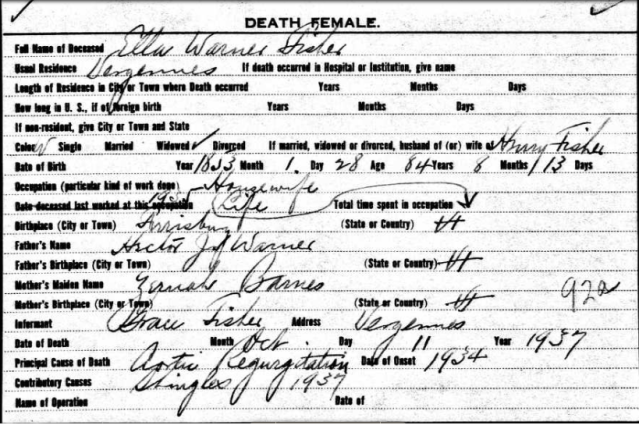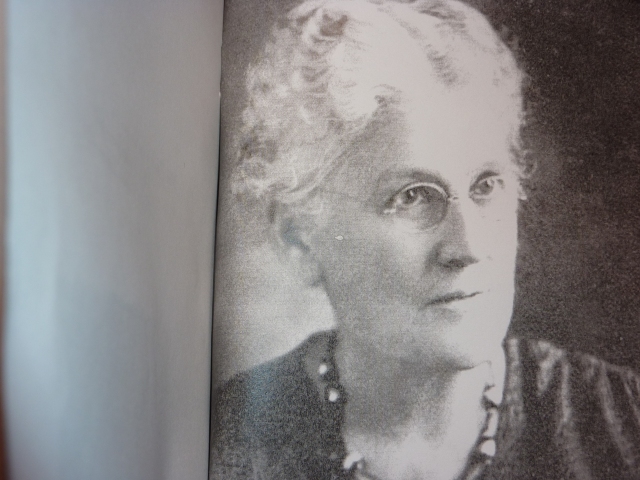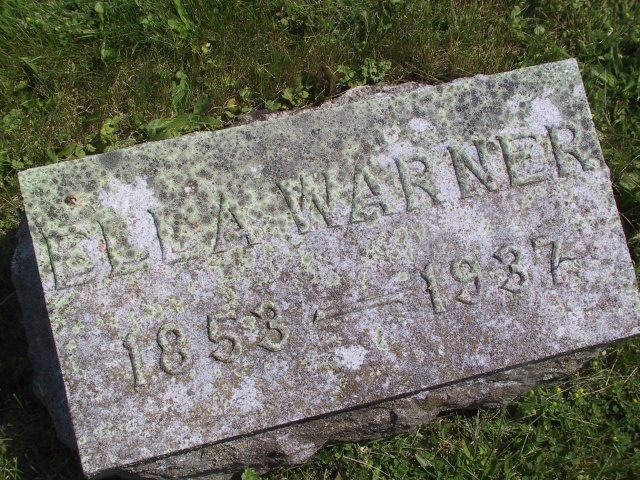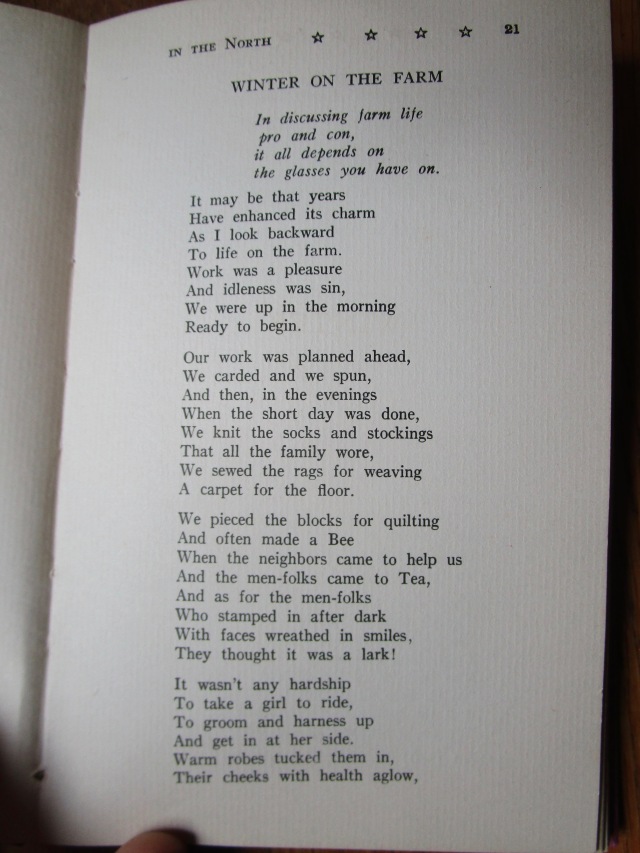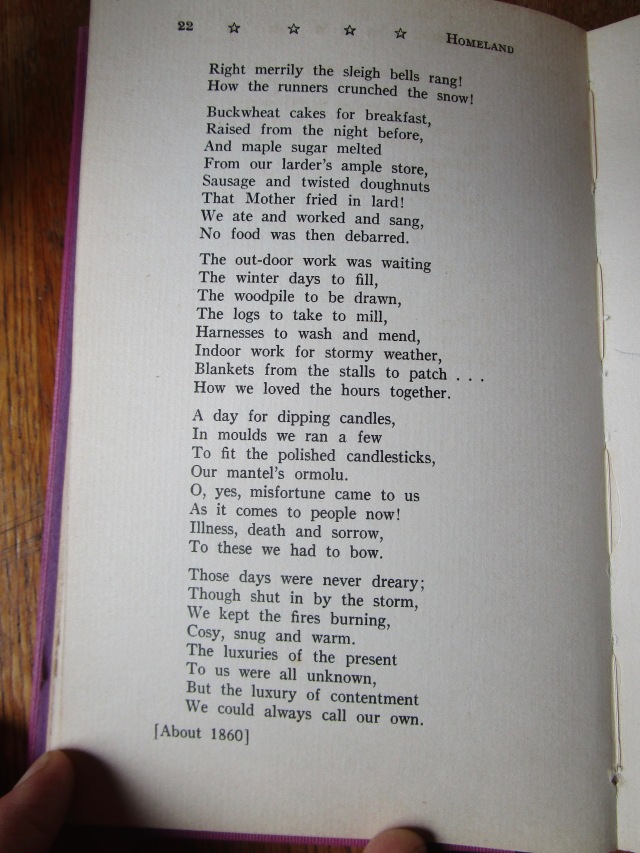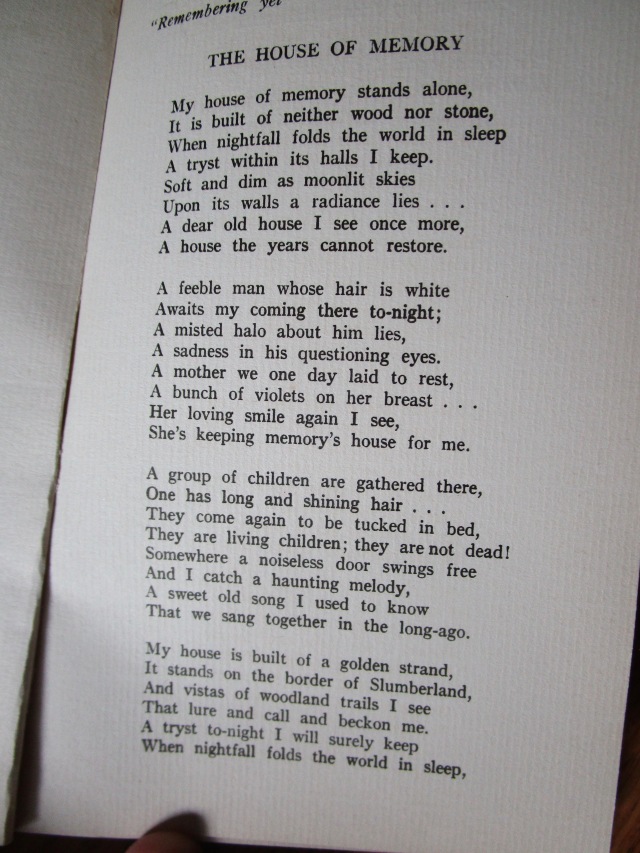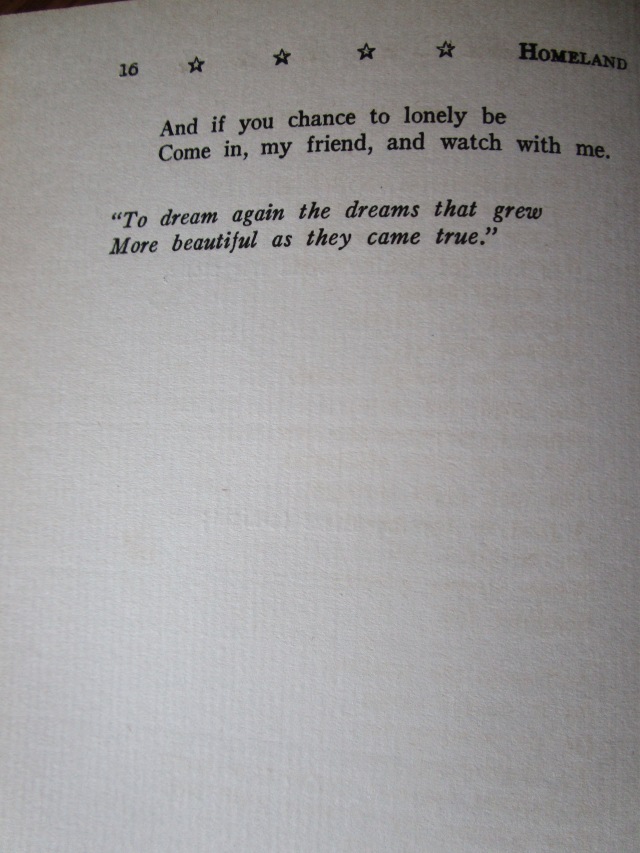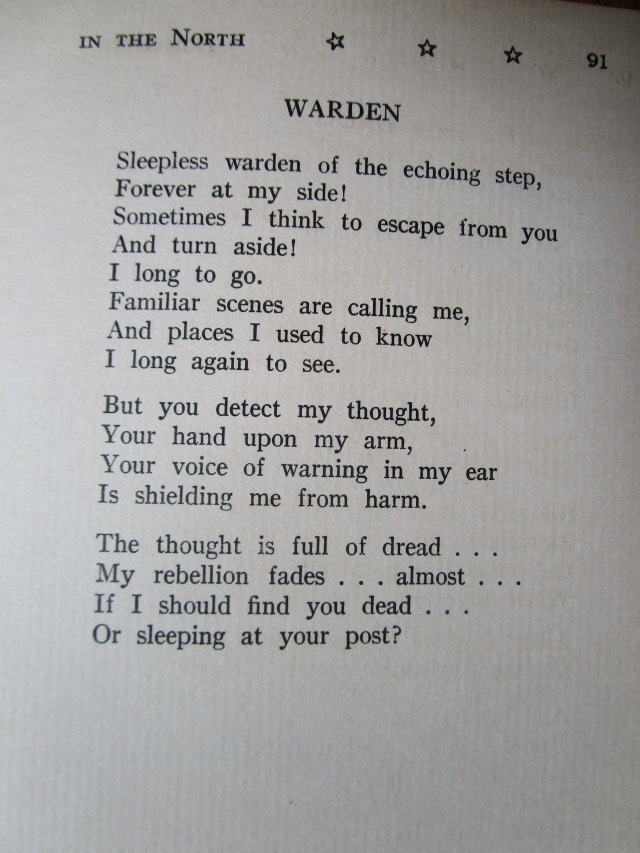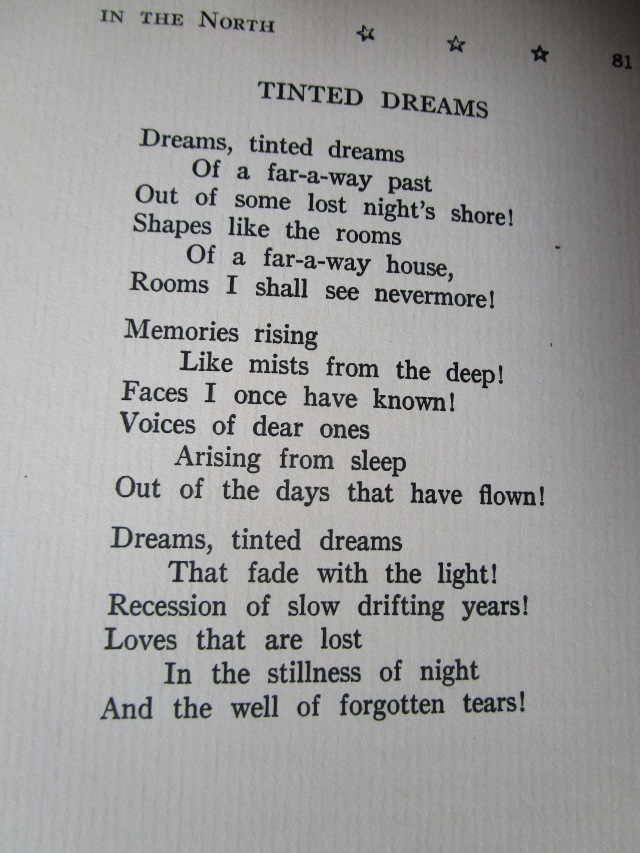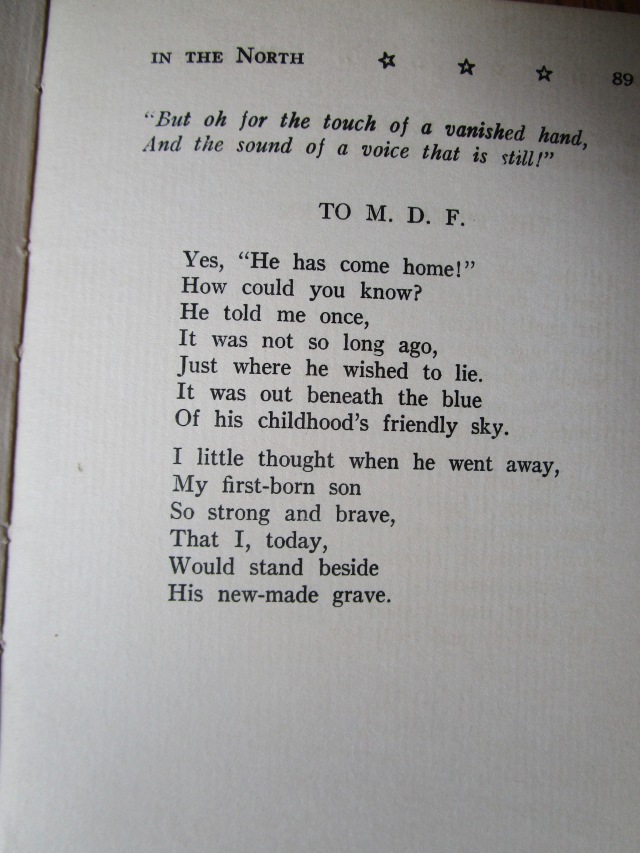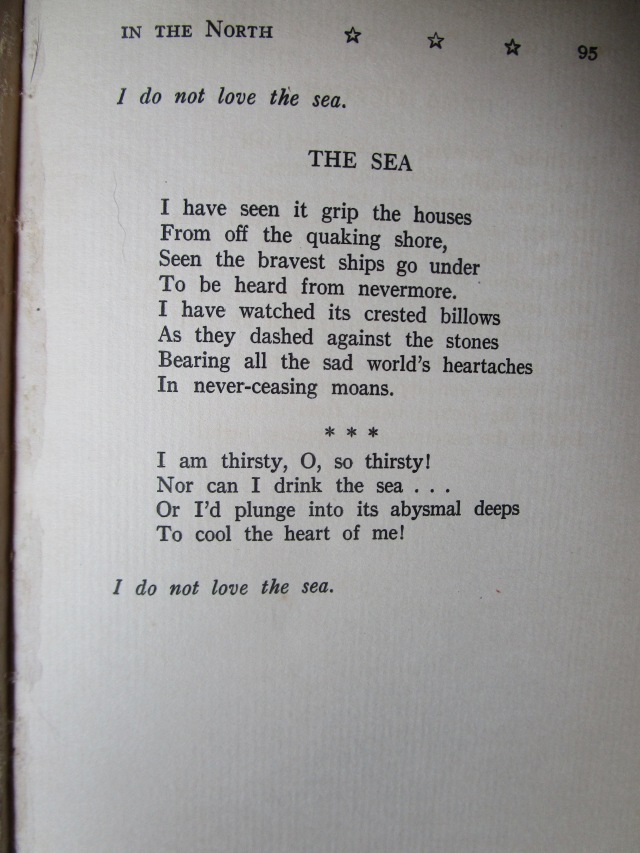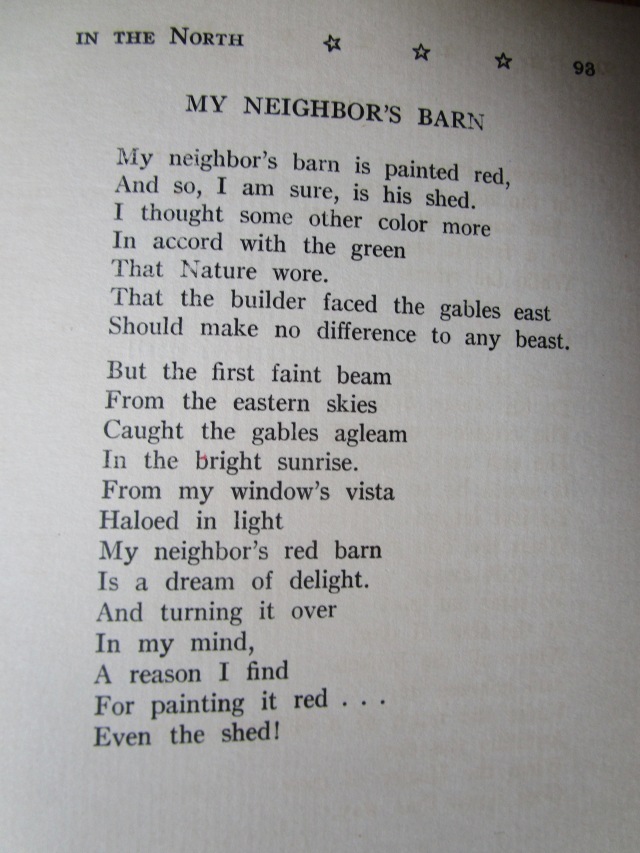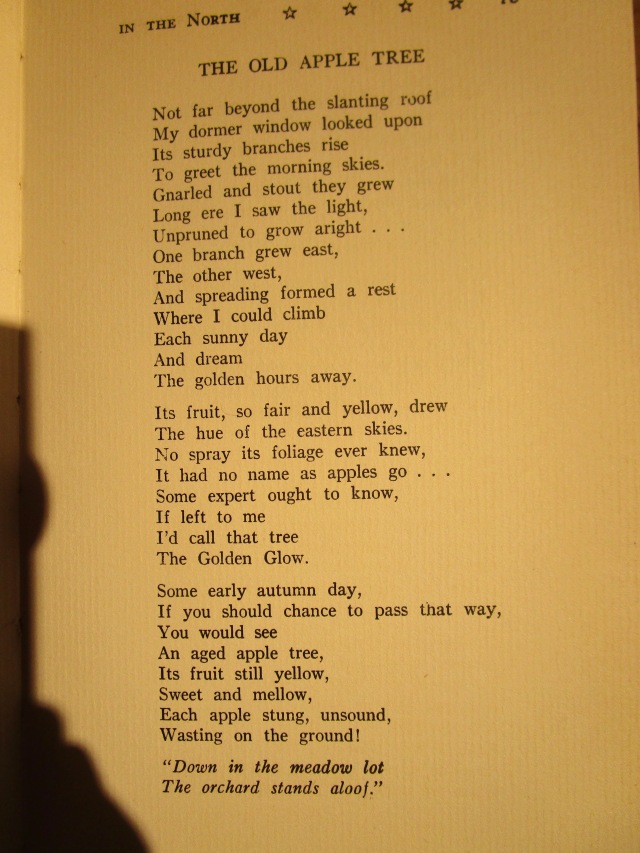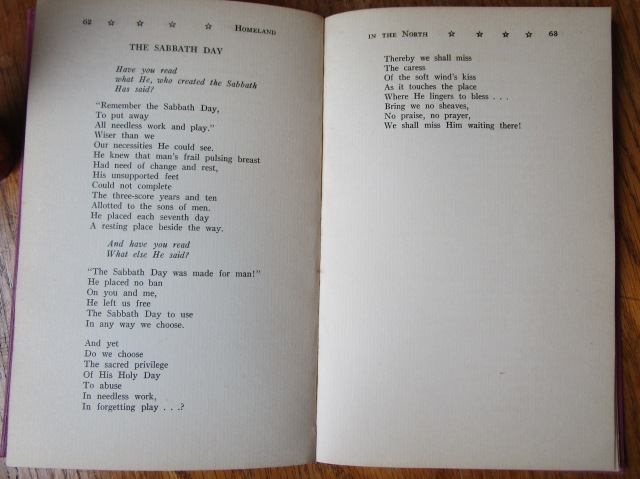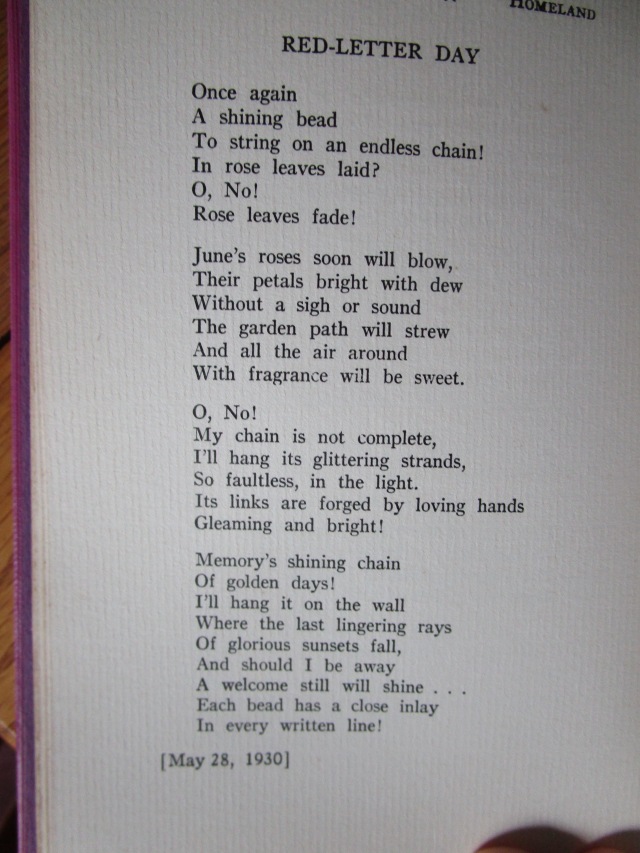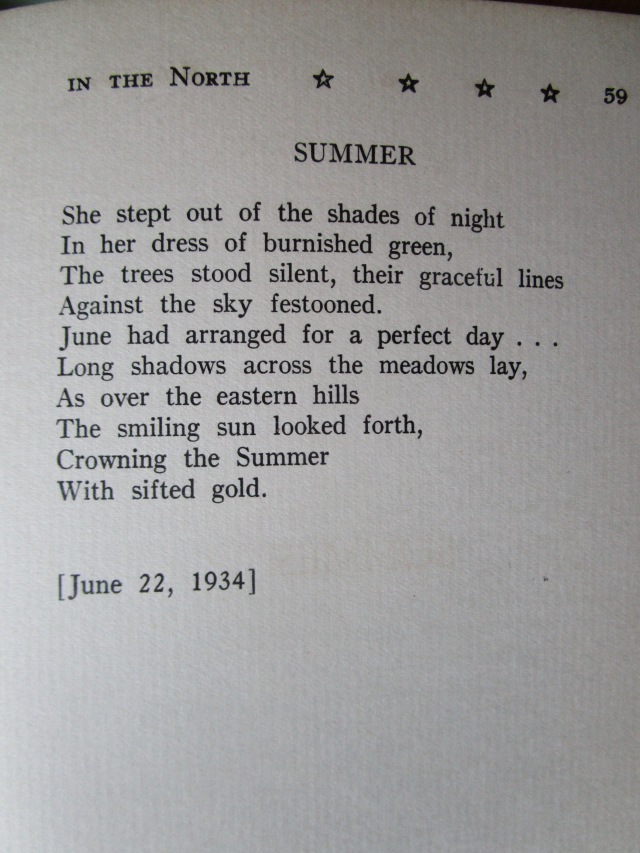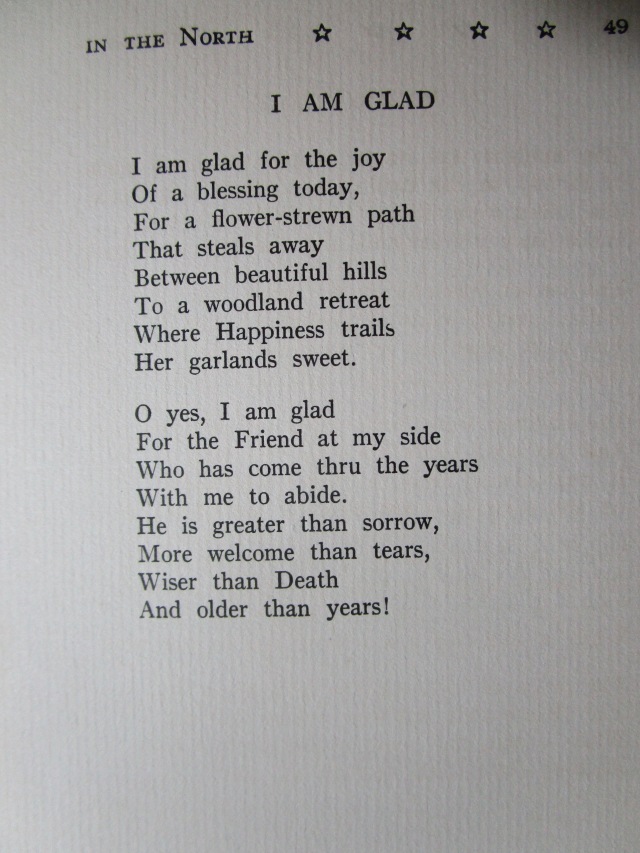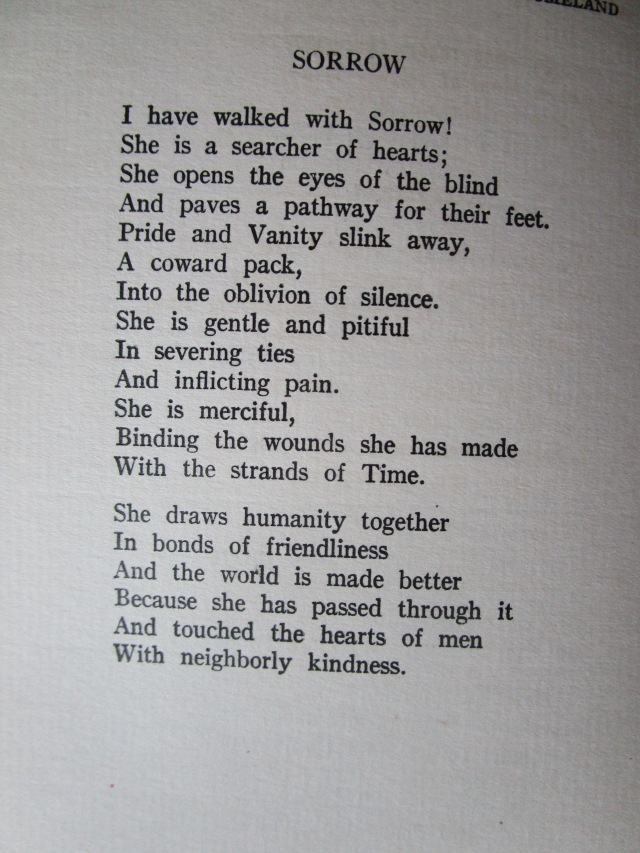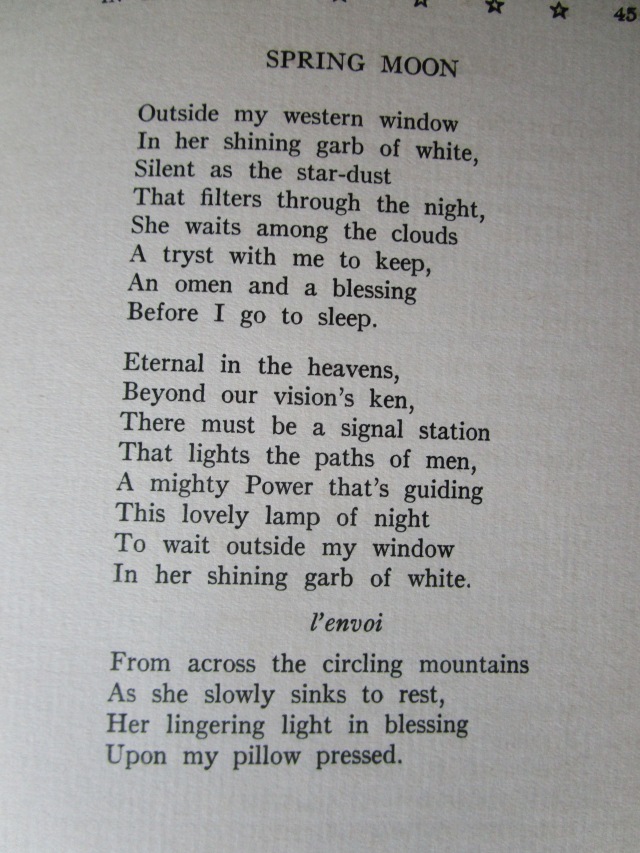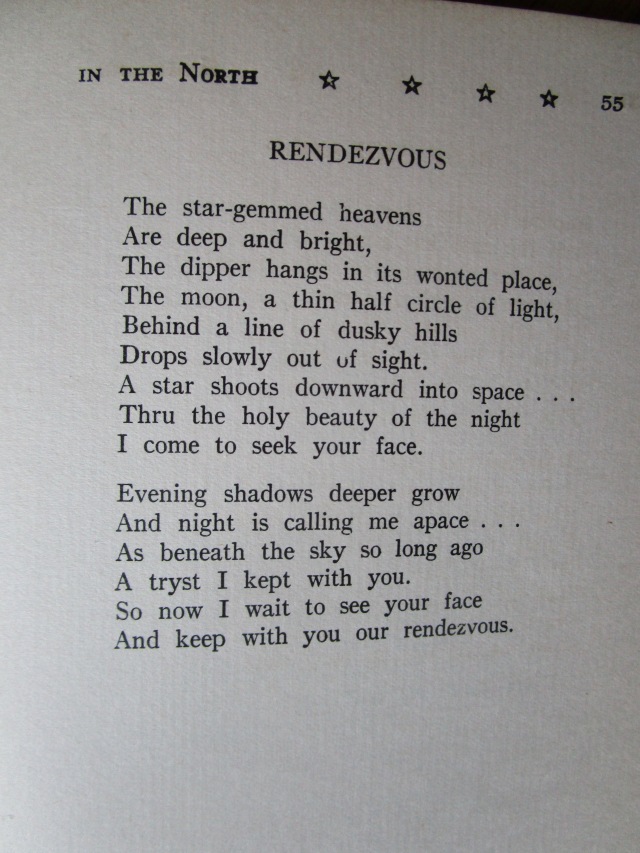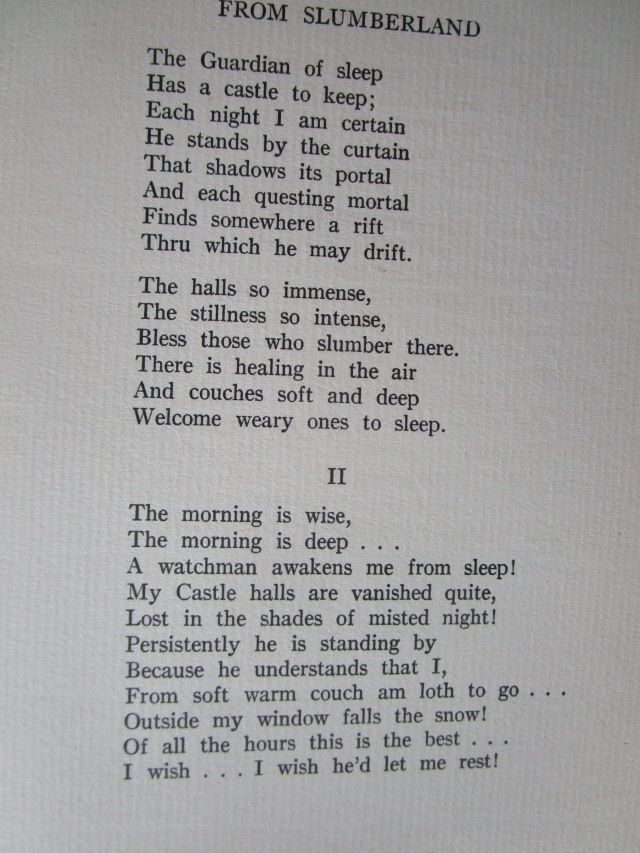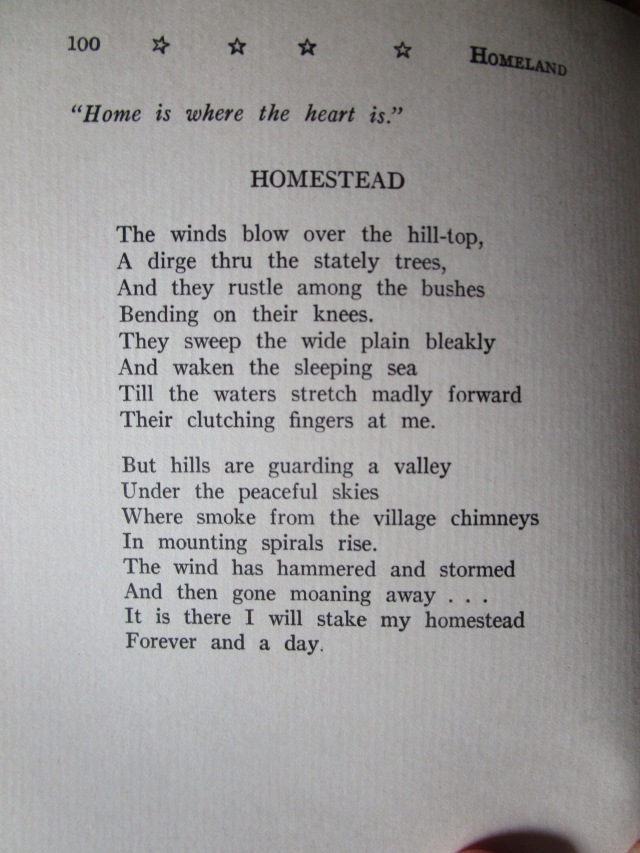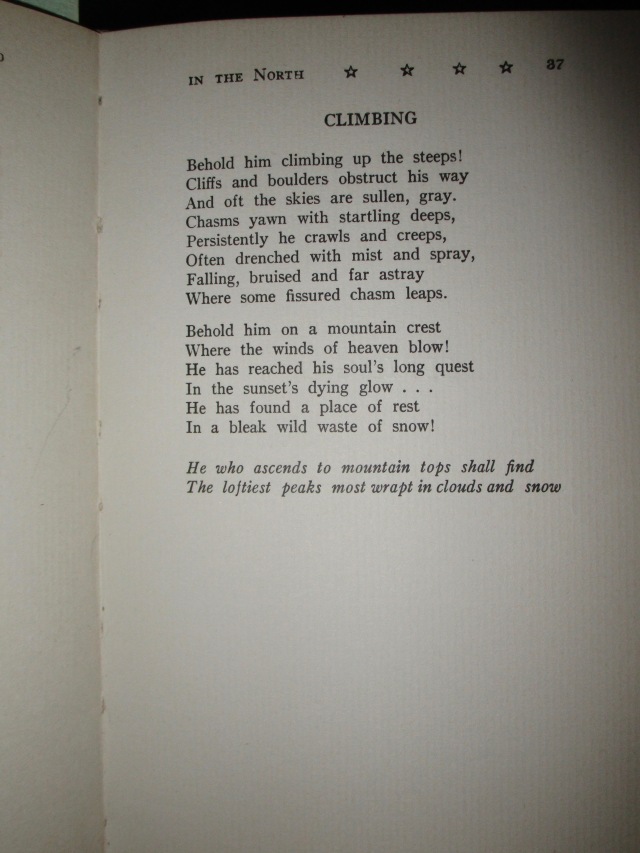NOVEMBER
Dark clouds are driven across the sky
As the mournful winds go fitfully by;
They whisper and wail thru the branches bare,
They fret and sting in the frosty air,
And secrets they tell as the searching pass
Where the leaves lie thick on the sodden grass.
In some vast amphitheatre, some awful height,
The forces of air have gathered in might;
Adown the wild November sky
In solid phalanx their horsemen fly,
They have blotted the sun in the murk of night;
I hear their carousal of mad delight,
Their hoofbeats against the window pane,
As they drench the earth with sheets of rain.
OCTOBER
The white and winding roadway
Lies beckoning in the sun,
With all the glowing hillsides
In intricate patterns done,
Designed in gold and cardinal,
Embossed with shades of green . . .
Among the year’s deft artists
You reign a lavish queen.
You have thrown around the maples
A robe of dazzling weaves
And garlanded the ledges
With crimson sumac leaves.
You have twined the meadow fences
With clinging bittersweet,
Your many garnered treasures
Are lying at our feet.
In thrift and rich accomplishment
With harvest stored away,
Homes along the countryside
Your refining touch betray.
It shines in other faces
And eyes that look at me
Along the winding roadway
From sea to pulsing sea.
O regal-clad October!
Already rude winds blow
To spread your lovely foliage
A carpet for the snow.
Already dark clouds hover
Against your skies of blue
And the day is drawing nearer
When we must part with you.
ABSENCE
It was but yesterday
You went from us away;
The skies were blue,
But we only knew
That the winding road
To your abode
Had passed
Into silence vast!
We knew that you had gone
Into distance on and on
And Loneliness was standing there
As one of grieves,
While sad winds were whispering
Among the falling leaves.
AN EMPTY NEST
“the robin is calling for rain!”
I hear you say it again,
But how do you know
And what authority tells you so?
It cannot be the bird
For that would be absurd.
You may as well confess
That your statment is a guess.
“The robin is calling for rain!”
The truth may give you pain . . .
Your pampered cat made free
to climb the apple tree
Where now is an empty nest,
The hurt in the bird’s small breat
Is filling her tiny throat
With a plaintive mourning note!
A PICTURE
An Indian standing straight and tall
In the sunlight gilding my western wall,
His hands outstretched to the setting sun,
His rapt face raised, with gold-thread spun.
To the unknown God, Great Spirit of love
Who watches His children from somewhere above,
Who answers the cry of the Red Man’s soul . .
His appeal for mercy has reached its goal!
The sun went down in a flaming sky,
The Indian worshipped, even as I . . .
Slowly the picture faded from sight,
Lost in the shadows of deepening night.
AS THE PENDULUM SWINGS
Somewhere in the past
Our forefathers taught
That each idle moment
With danger was fraught,
That time was too precious
To fritter away . . .
An account we must render
When it came to Judgment Day.
But now we are busy
With a number of things
And time pauses not
As the pendulum swings.
Our thought so intent
On the problems we find
That we grow automatic
And worldly inclined.
There is no time to listen
To a voice so small
On our dull ears grown fainter
Till it ceases to call.
Comes an hour in the silence
With none to molest,
Our busy hands folded
In quiet and rest;
We relax in the sitllness,
Immune and thought free,
Where impressions are waiting
For you and for me.
There is safety in silence,
a reshaping of things
And vistas of beauty
As the pendulum swings.
BLUE AND GOLD
Another golden day
Into the past has gone,
It carried a dream of mine away,
The one I held in pawn.
The color of the skies,
A bit of the flawless blue
Was left in the steady eyes
That lighted the soul of you.
A scintillating gleam,
A bit of the sun’s bright gold,
The last of the vanishing dream
I may no longer hold,
And purple shadows hide
The bit of blue and gold . . .
Alone in the silence I bide
And the night is growing old.
BREAKING OF THE DROUTH
The sweltering sun looked steadily down
From a brazen sky on field and town,
It dwarfed each shrub, it wilted each flower
And shone and shone in its unchecked power;
It looked on the meadows; the grass turned brown;
It traversed the pasture slopes adown
On the bitten roots of the trodden grass
Where hungry herds must daily pass.
The waters that coursed the river bed
Became a shriveled, shrunken thread;
On the wooded steeps a smouldering spark
crept silently thru the sulphurous dark;
It gathered force and soon because
A million tongues of devouring flame.
The winds took up the mad refrain
And swept the smoke across the plain;
It enveloped the valley that lay below
Where lines of traffic come and go;
It drifted in at the open door
Of a little church. On the chancel floor
An old man knelt in earnest prayer,
And this is the plea he uttered there,
“Carest Thou not that we perish?” he cried,
“Carest Thou not that our streams are dried
Our cattle stand spineless with nothing to eat,
The earth shrieks in protest under our feet,
A foodless winter is drawing nigh . . .
Carest Thou not that Thy children die?”
As the regretful sun went down
The dark crept swifly on field and town,
But darker still enmassed on high
Storm clouds climbed the midnight sky.
A battle raged in the upper air,
Heaven’s artillery crashing there . . .
Thru earth and sky from end to end
In one awful blinding lurid blend!
Over the parched and wilted plain,
Over the valley poured the rain!
It quenched the fires on the mountain side,
It raised the streams to a raging tide;
Trees and bridges and homes it bore,
Silt and water lay on the church floor;
Out in the fields the cattle lay dead
And dark rolled the storm clouds overhead!
On a hillside the rescued gathered to gaze
On the scene of ruinh in silent amaze. . .
An old man broke the spell to say
“The Lord has washed our sins away!”
BUT YESTERDAY
It may be far and far away
But it really seems but yesterday
That I
Turned the pans and pails
On a bench to dry,
Waiting the time
When the morning sun
Would climb the sky.
The light work done
I could hasten away
In the cool of the day.
For I knew
Of a spot
In the east-meadow lot
Where the strawberries grew.
I could hear the whetstones ringing,
The scythes would soon be swinging,
Coming down that way
In the cool of the day.
The acme of delight
Was the meal at night.
As the men took their places
Smiles wreathed their faces . . .
The table helpd a tempting spread,
Farmer’s men must be well fed,
But the crowning joy
In their esteem
Was two big shortcakes
Rich with cream!
It may be far and far away
But it really seems but yesterday!
“And now that all is past, I sit alone
And revel in the thoughts of what has been.”
THE CHRISTMAS LILY
A small child raised an eager face,
Her finger held tight to keep the place,
I’ll send some flowers and a litle line
To the man who made this paper so fine.”
She saw from the window not one was there,
The wind-swept earth was bleak and bare,
But the day before on the window seat
A lily had opened its petals sweet.
“Mama!” she cried, “Let me have it, I pray,
He’ll be sure to get it on Christmas Day!”
The flower was cu and some vines of green
Packed and posted with the line between.
A weary editor sat late in his chair,
His brow was knit with worry and care,
With hasty scissors he clipped a string . . .
“Who sent me, I wonder, so light a thing?”
Gently he lifted the snowy bloom,
Its fragrance filled his littered room!
The little line fluttered and fell at his feet
Bearing a message of gratitude sweet.
A tear stole slowly down his face
As he cast about to find a vase.
In a little shop just over the way
He purchased the best in the window’s display,
He tidied his desk, the flower to leave,
A sweet reminder of Christmas eve.
The lily faded. It ssweetness was gone,
But the vine of green lived on and on;
He sometimes added a hothouse flower,
It cheered his heart thru the busy hour;
When days were dark he looked and smiled
At the loving gift of a grateful child.

